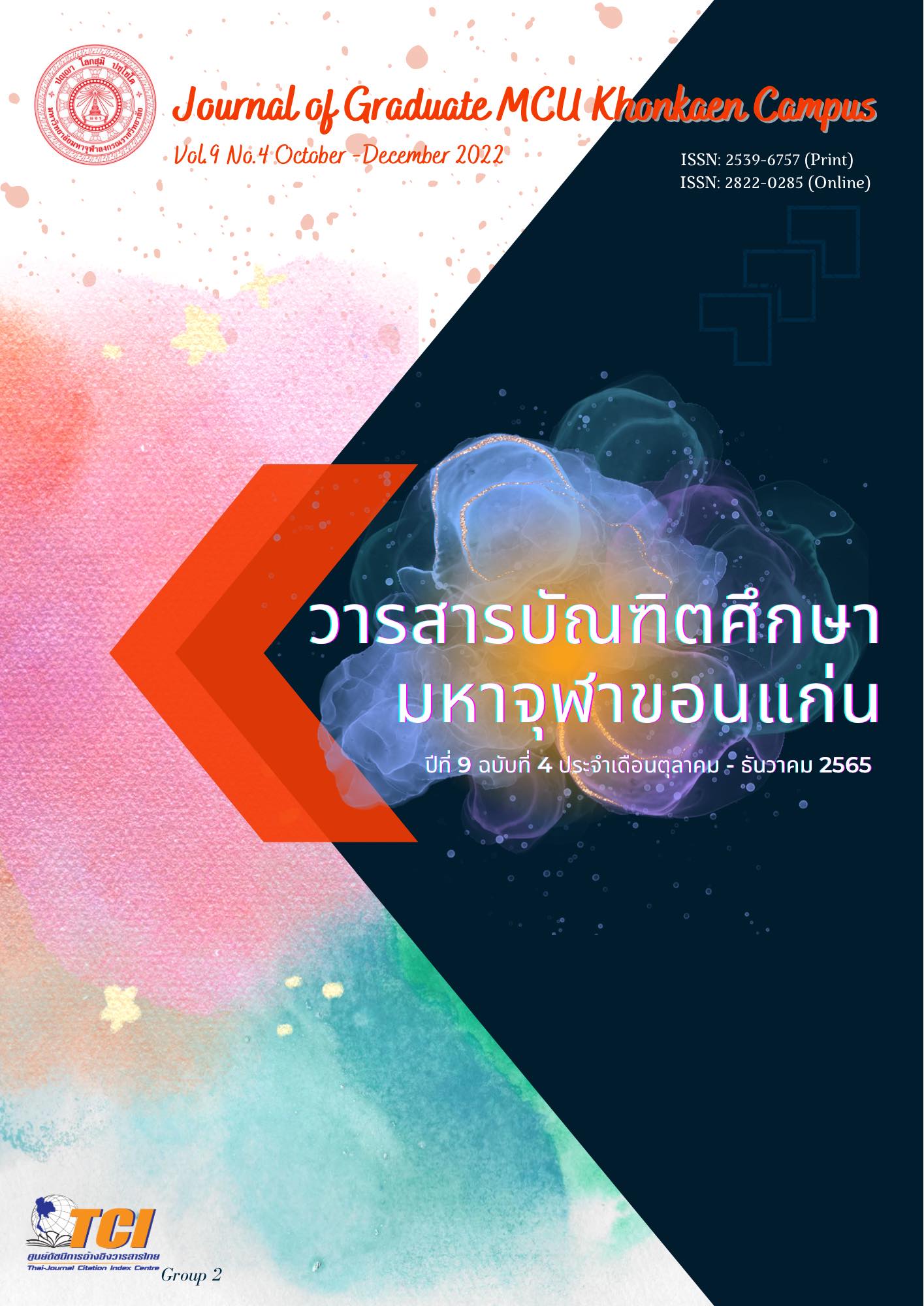The Devlopment of Learnning Achievement on the Subject “Economic” in the Learning Area of Studies Religious and Culture of the Sixth Year Rimary School Students at Ban Nong Khu School by Using Learning Skill Training Exercise
Main Article Content
Abstract
The objectives of this research were: to develop the Buddhist learning skill training exercises by using meditation-based learning on the subject 'Economics' to meet the set criterion of 80/80; to compare the learning achievements on the subject 'Economics' before and after using the learning skill training exercise; to assess the six-year primary school students' satisfaction with the learning skill training exercise. This study utilized the experimental research methodology with one experimental group of 30 students selected by purposive sampling. The statistics used in data analysis were: Mean and Standard Deviation.
The research results were as follows: For the development of the Buddhist learning skill training exercises by using meditation-based learning on the subject 'Economics,'
the exercise consisted of the following learning plans: producers and consumers, economic relations, tax and tax benefits, natural resources. Students scored the
pre-exercise for each plan with an average of 43.95 or 87.9%. For post-exercise, their average score was 91.81 with an effectiveness value of E1/E2 = 87.90/91.81, higher than the criterion 80/80. Based on the comparison of the learning achievements on the subject ‘Economics’ before and after using the learning skill training exercise, the learning achievement before and after using the Buddhist learning skill training exercise integrated with meditation-based learning was different with a statistical significance level 0.01. The average score after learning was higher than that of before learning. The six-year primary school students' satisfaction with the Buddhist learning skill training exercises using meditation-based learning on the subject 'Economics' was statistically rated at the highest level.
Article Details

This work is licensed under a Creative Commons Attribution-NonCommercial-NoDerivatives 4.0 International License.
References
กรมวิชาการ. (2546). การจัดสาระการเรียนสังคมศึกษา ศาสนา และวัฒนธรรม กลุ่มสาระการเรียนรู้สังคมศึกษา ศาสนา และวัฒนธรรม. กรุงเทพฯ: องค์การรับส่งสินค้าและพัสดุภัณฑ์ (ร.ส.พ.).
กระทรวงศึกษาธิการ. หลักสูตรแกนกลางการศึกษาขั้นพื้นฐาน พุทธศักราช 2551 (ฉบับปรับปรุง พ.ศ.2560)
ชัยยงค์ พรหมวงศ์. (2556). การทดสอบประสิทธิภาพสื่อหรือชุดการสอน. วารสารศิลปากรศึกษาศาสตร์วิจัย, 5(1), 7-20.
ปราณี กองจินดำ. (2549). การเปรียบเทียบผลสัมฤทธิ์ทางการเรียนคณิตศาสตร์และทักษะการคิดเลขในใจของนักเรียนที่ได้รับการสอนตามรูปแบบซิปปา โดยใช้แบบฝึกหัดที่เน้นทักษะการคิดเลขในใจกับนักเรียนที่ได้รับการสอนโดยใช้คู่มือครู. (วิทยานิพนธ์ครุศาสตรมหาบัณฑิต). พระนครศรีอยุธยา: มหาวิทยาลัยราชภัฎพระนครศรีอยุธยา.
ผสมพร ประจันตะเสน. (2550). การเพิ่มผลสัมฤทธิ์ทางการเรียนวิชาสังคมศึกษา ศาสนา และวัฒนธรรม เรื่อง ลักษณะภูมิประเทศของไทย. ม.ป.พ.
พระอธิการมาวิน จนฺทธมฺโม (อ้วนจี). (2561). การพัฒนาชุดการสอนสาระการเรียนรู้สังคมศึกษาศาสนาและวัฒนธรรมโดยใช้พุทธวิธีการสอน เรื่อง เบญจศีลเบญจธรรมนักเรียนชั้นมัธยมศึกษาปีที่ 3 โรงเรียนบ้านผึ้งวิทยาคม จังหวัดนครพนม. (วิทยานิพนธ์พุทธศาสตรมหาบัณฑิต). กรุงเทพฯ: มหาวิทยาลัยมหาจุฬาลงกรณราชวิทยาลัย.
พิทักษ์ ตรุษทิม. (2548). ความพึงพอใจของประชาชนต่อระบบและกระบวนให้บริการของกรุงเทพมหานครศึกษากรณีสำนักงานเขตยานนาวา. (วิทยานิพนธ์พัฒนบริหารศาสตร์สาขาวิชาพัฒนาสังคม). กรุงเทพฯ: สถาบันบัณฑิตพัฒนบริหารศาสตร์.
Lai and Viering. (May 2019). Developing a performance assessment task in the Finnish British. Journal of EducationalPsychology, 89(1)
Luterbach, Kenneth J., and Carol Brown. (2011). Education for the 21st century. International Journal of Applied Educational Studies, 11(1), 14.
Osman, K & Marimuthu, N.,. (2010). Setting new learning targets for the 21 century science education in Malaysia. Procedia Social and Behavioural Sciences, 2, 3737-3741.

